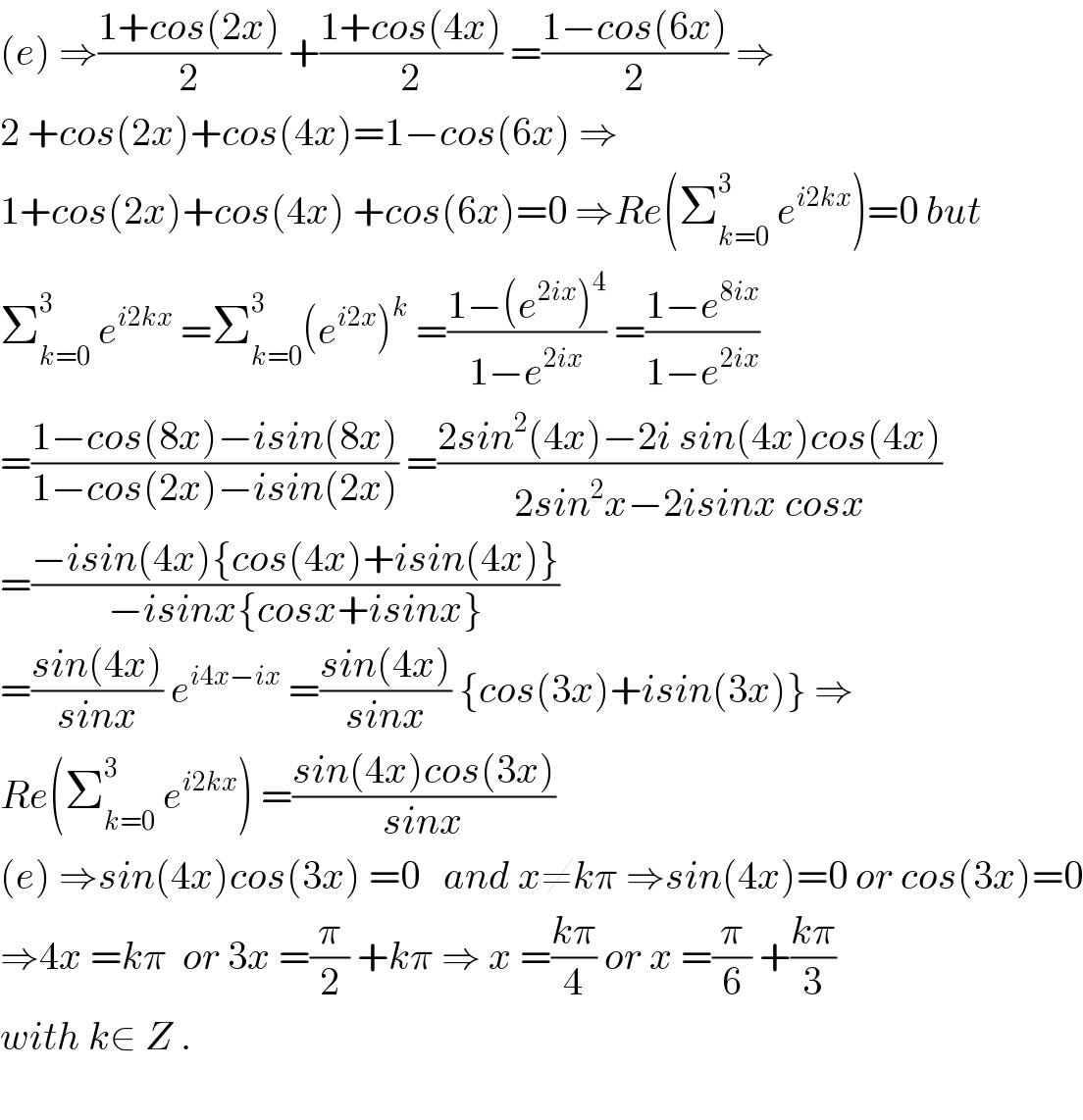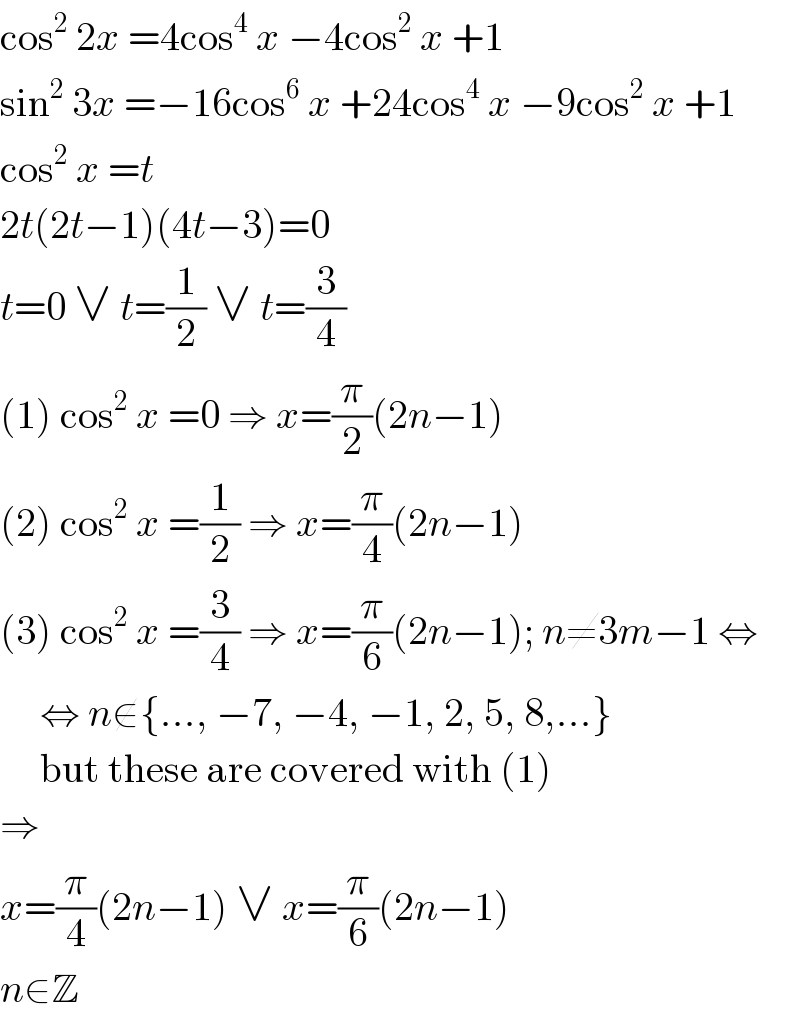
Question Number 67516 by LPM last updated on 28/Aug/19

Commented by Prithwish sen last updated on 28/Aug/19
![cos^2 x +(2cos^2 x−1)^2 = 1−cos^2 3x Simplyfying we get, 2cos^2 x(4cos^4 x−10cos^2 x+3)=0 ⇒cos^2 x = 0 and cos^2 x=((10±(√(52)))/8) ∴ x=(2n−1)(π/2) and x = Cos^(−1) [((√(5±(√(13))))/2)] please check.](Q67543.png)
$$\mathrm{cos}^{\mathrm{2}} \mathrm{x}\:+\left(\mathrm{2cos}^{\mathrm{2}} \mathrm{x}−\mathrm{1}\right)^{\mathrm{2}} =\:\mathrm{1}−\mathrm{cos}^{\mathrm{2}} \mathrm{3x} \\ $$$$\mathrm{Simplyfying}\:\mathrm{we}\:\mathrm{get}, \\ $$$$\mathrm{2cos}^{\mathrm{2}} \mathrm{x}\left(\mathrm{4cos}^{\mathrm{4}} \mathrm{x}−\mathrm{10cos}^{\mathrm{2}} \mathrm{x}+\mathrm{3}\right)=\mathrm{0} \\ $$$$\Rightarrow\mathrm{cos}^{\mathrm{2}} \mathrm{x}\:=\:\mathrm{0}\:\:\:\mathrm{and}\:\mathrm{cos}^{\mathrm{2}} \mathrm{x}=\frac{\mathrm{10}\pm\sqrt{\mathrm{52}}}{\mathrm{8}} \\ $$$$\therefore\:\mathrm{x}=\left(\mathrm{2n}−\mathrm{1}\right)\frac{\pi}{\mathrm{2}}\:\:\mathrm{and}\:\mathrm{x}\:=\:\mathrm{Cos}^{−\mathrm{1}} \left[\frac{\sqrt{\mathrm{5}\pm\sqrt{\mathrm{13}}}}{\mathrm{2}}\right] \\ $$$$\boldsymbol{\mathrm{please}}\:\boldsymbol{\mathrm{check}}. \\ $$
Commented by mathmax by abdo last updated on 19/Sep/19

$$\left({e}\right)\:\Rightarrow\frac{\mathrm{1}+{cos}\left(\mathrm{2}{x}\right)}{\mathrm{2}}\:+\frac{\mathrm{1}+{cos}\left(\mathrm{4}{x}\right)}{\mathrm{2}}\:=\frac{\mathrm{1}−{cos}\left(\mathrm{6}{x}\right)}{\mathrm{2}}\:\Rightarrow \\ $$$$\mathrm{2}\:+{cos}\left(\mathrm{2}{x}\right)+{cos}\left(\mathrm{4}{x}\right)=\mathrm{1}−{cos}\left(\mathrm{6}{x}\right)\:\Rightarrow \\ $$$$\mathrm{1}+{cos}\left(\mathrm{2}{x}\right)+{cos}\left(\mathrm{4}{x}\right)\:+{cos}\left(\mathrm{6}{x}\right)=\mathrm{0}\:\Rightarrow{Re}\left(\sum_{{k}=\mathrm{0}} ^{\mathrm{3}} \:{e}^{{i}\mathrm{2}{kx}} \right)=\mathrm{0}\:{but} \\ $$$$\sum_{{k}=\mathrm{0}} ^{\mathrm{3}} \:{e}^{{i}\mathrm{2}{kx}} \:=\sum_{{k}=\mathrm{0}} ^{\mathrm{3}} \left({e}^{{i}\mathrm{2}{x}} \right)^{{k}} \:=\frac{\mathrm{1}−\left({e}^{\mathrm{2}{ix}} \right)^{\mathrm{4}} }{\mathrm{1}−{e}^{\mathrm{2}{ix}} }\:=\frac{\mathrm{1}−{e}^{\mathrm{8}{ix}} }{\mathrm{1}−{e}^{\mathrm{2}{ix}} } \\ $$$$=\frac{\mathrm{1}−{cos}\left(\mathrm{8}{x}\right)−{isin}\left(\mathrm{8}{x}\right)}{\mathrm{1}−{cos}\left(\mathrm{2}{x}\right)−{isin}\left(\mathrm{2}{x}\right)}\:=\frac{\mathrm{2}{sin}^{\mathrm{2}} \left(\mathrm{4}{x}\right)−\mathrm{2}{i}\:{sin}\left(\mathrm{4}{x}\right){cos}\left(\mathrm{4}{x}\right)}{\mathrm{2}{sin}^{\mathrm{2}} {x}−\mathrm{2}{isinx}\:{cosx}} \\ $$$$=\frac{−{isin}\left(\mathrm{4}{x}\right)\left\{{cos}\left(\mathrm{4}{x}\right)+{isin}\left(\mathrm{4}{x}\right)\right\}}{−{isinx}\left\{{cosx}+{isinx}\right\}} \\ $$$$=\frac{{sin}\left(\mathrm{4}{x}\right)}{{sinx}}\:{e}^{{i}\mathrm{4}{x}−{ix}} \:=\frac{{sin}\left(\mathrm{4}{x}\right)}{{sinx}}\:\left\{{cos}\left(\mathrm{3}{x}\right)+{isin}\left(\mathrm{3}{x}\right)\right\}\:\Rightarrow \\ $$$${Re}\left(\sum_{{k}=\mathrm{0}} ^{\mathrm{3}} \:{e}^{{i}\mathrm{2}{kx}} \right)\:=\frac{{sin}\left(\mathrm{4}{x}\right){cos}\left(\mathrm{3}{x}\right)}{{sinx}} \\ $$$$\left({e}\right)\:\Rightarrow{sin}\left(\mathrm{4}{x}\right){cos}\left(\mathrm{3}{x}\right)\:=\mathrm{0}\:\:\:{and}\:{x}\neq{k}\pi\:\Rightarrow{sin}\left(\mathrm{4}{x}\right)=\mathrm{0}\:{or}\:{cos}\left(\mathrm{3}{x}\right)=\mathrm{0} \\ $$$$\Rightarrow\mathrm{4}{x}\:={k}\pi\:\:{or}\:\mathrm{3}{x}\:=\frac{\pi}{\mathrm{2}}\:+{k}\pi\:\Rightarrow\:{x}\:=\frac{{k}\pi}{\mathrm{4}}\:{or}\:{x}\:=\frac{\pi}{\mathrm{6}}\:+\frac{{k}\pi}{\mathrm{3}} \\ $$$${with}\:{k}\in\:{Z}\:. \\ $$$$ \\ $$
Answered by MJS last updated on 18/Sep/19

$$\mathrm{cos}^{\mathrm{2}} \:\mathrm{2}{x}\:=\mathrm{4cos}^{\mathrm{4}} \:{x}\:−\mathrm{4cos}^{\mathrm{2}} \:{x}\:+\mathrm{1} \\ $$$$\mathrm{sin}^{\mathrm{2}} \:\mathrm{3}{x}\:=−\mathrm{16cos}^{\mathrm{6}} \:{x}\:+\mathrm{24cos}^{\mathrm{4}} \:{x}\:−\mathrm{9cos}^{\mathrm{2}} \:{x}\:+\mathrm{1} \\ $$$$\mathrm{cos}^{\mathrm{2}} \:{x}\:={t} \\ $$$$\mathrm{2}{t}\left(\mathrm{2}{t}−\mathrm{1}\right)\left(\mathrm{4}{t}−\mathrm{3}\right)=\mathrm{0} \\ $$$${t}=\mathrm{0}\:\vee\:{t}=\frac{\mathrm{1}}{\mathrm{2}}\:\vee\:{t}=\frac{\mathrm{3}}{\mathrm{4}} \\ $$$$\left(\mathrm{1}\right)\:\mathrm{cos}^{\mathrm{2}} \:{x}\:=\mathrm{0}\:\Rightarrow\:{x}=\frac{\pi}{\mathrm{2}}\left(\mathrm{2}{n}−\mathrm{1}\right) \\ $$$$\left(\mathrm{2}\right)\:\mathrm{cos}^{\mathrm{2}} \:{x}\:=\frac{\mathrm{1}}{\mathrm{2}}\:\Rightarrow\:{x}=\frac{\pi}{\mathrm{4}}\left(\mathrm{2}{n}−\mathrm{1}\right) \\ $$$$\left(\mathrm{3}\right)\:\mathrm{cos}^{\mathrm{2}} \:{x}\:=\frac{\mathrm{3}}{\mathrm{4}}\:\Rightarrow\:{x}=\frac{\pi}{\mathrm{6}}\left(\mathrm{2}{n}−\mathrm{1}\right);\:{n}\neq\mathrm{3}{m}−\mathrm{1}\:\Leftrightarrow \\ $$$$\:\:\:\:\:\Leftrightarrow\:{n}\notin\left\{...,\:−\mathrm{7},\:−\mathrm{4},\:−\mathrm{1},\:\mathrm{2},\:\mathrm{5},\:\mathrm{8},...\right\} \\ $$$$\:\:\:\:\:\mathrm{but}\:\mathrm{these}\:\mathrm{are}\:\mathrm{covered}\:\mathrm{with}\:\left(\mathrm{1}\right) \\ $$$$\Rightarrow \\ $$$${x}=\frac{\pi}{\mathrm{4}}\left(\mathrm{2}{n}−\mathrm{1}\right)\:\vee\:{x}=\frac{\pi}{\mathrm{6}}\left(\mathrm{2}{n}−\mathrm{1}\right) \\ $$$${n}\in\mathbb{Z} \\ $$
Commented by Prithwish sen last updated on 28/Aug/19

$$\mathrm{thank}\:\mathrm{you}\:\mathrm{sir}. \\ $$
Answered by mr W last updated on 28/Aug/19

$${let}\:{t}=\mathrm{cos}^{\mathrm{2}} \:{x}\geqslant\mathrm{0} \\ $$$$\mathrm{sin}^{\mathrm{2}} \:\mathrm{3}{x}=\left(\mathrm{1}−\mathrm{cos}^{\mathrm{2}} \:{x}\right)\left(\mathrm{4}\:\mathrm{cos}^{\mathrm{2}} \:{x}−\mathrm{1}\right)^{\mathrm{2}} =\left(\mathrm{1}−{t}\right)\left(\mathrm{4}{t}−\mathrm{1}\right)^{\mathrm{2}} \\ $$$$\mathrm{cos}^{\mathrm{2}} \:\mathrm{2}{x}=\left(\mathrm{2}\:\mathrm{cos}^{\mathrm{2}} \:{x}−\mathrm{1}\right)^{\mathrm{2}} =\left(\mathrm{2}{t}−\mathrm{1}\right)^{\mathrm{2}} \\ $$$${t}+\left(\mathrm{2}{t}−\mathrm{1}\right)^{\mathrm{2}} =\left(\mathrm{1}−{t}\right)\left(\mathrm{4}{t}−\mathrm{1}\right)^{\mathrm{2}} \\ $$$${t}\left(\mathrm{8}{t}^{\mathrm{2}} −\mathrm{10}{t}+\mathrm{3}\right)=\mathrm{0} \\ $$$$\Rightarrow{t}=\mathrm{0},\:\frac{\mathrm{1}}{\mathrm{2}},\:\frac{\mathrm{3}}{\mathrm{4}} \\ $$$${with}\:\mathrm{cos}^{\mathrm{2}} \:{x}=\mathrm{0}: \\ $$$$\Rightarrow{x}={n}\pi\pm\frac{\pi}{\mathrm{2}} \\ $$$${with}\:\mathrm{cos}^{\mathrm{2}} \:{x}=\frac{\mathrm{1}}{\mathrm{2}}: \\ $$$$\mathrm{cos}\:{x}=\pm\frac{\sqrt{\mathrm{2}}}{\mathrm{2}} \\ $$$$\Rightarrow{x}={n}\pi\pm\frac{\pi}{\mathrm{4}} \\ $$$${with}\:\mathrm{cos}^{\mathrm{2}} \:{x}=\frac{\mathrm{3}}{\mathrm{4}}: \\ $$$$\mathrm{cos}\:{x}=\pm\frac{\sqrt{\mathrm{3}}}{\mathrm{2}} \\ $$$$\Rightarrow{x}={n}\pi\pm\frac{\pi}{\mathrm{6}} \\ $$
Commented by Prithwish sen last updated on 28/Aug/19

$$\mathrm{thank}\:\mathrm{you}\:\mathrm{sir}. \\ $$
Commented by LPM last updated on 29/Aug/19

$$\mathrm{goood} \\ $$$$ \\ $$
